Aggregator
Republicans strive to muzzle anti-genocide students
Quaker college’s president fails to speak against Israeli war crimes amidst her condemnations of anti-Semitism.
Man who stabbed Salman Rushdie sentenced to 25 years in prison – video
The man who stabbed and partially blinded novelist Salman Rushdie in 2022 has been sentenced to 25 years in prison on Friday for an attack that also wounded a second man, a district attorney has said. Hadi Matar was sentenced in a western New York courtroom, where a jury found him guilty earlier this year of attempted murder and assault. The 27-year-old stabbed Rushdie multiple times, blinding him in one eye, as the author was about to speak at the Chautauqua Institution
Continue reading...Israel kills 100 Palestinians on Nakba Day
Two Khan Younis hospitals bombed, killing dozens, including prominent journalist Hassan Aslayeh in his clinic bed.
My Rabb Will Never Abandon Us: A Personal Journey Through Love, Loss, And Tawakkul
The sound of his laughter still echoes in my heart, even now. Hanafi, my husband of 14 years, had a way of filling a room with warmth and light. His humour was subtle but sharp, a quiet wit that always found its mark. He would smile in that knowing way of his, delivering lines that would catch us off guard and leave us laughing long after. He was our joy, our anchor, the man who made our house a home.
It happened swiftly. Too swiftly for me to fully comprehend. One moment, we were celebrating the arrival of our second daughter, a miracle we had waited 11 long years for. The next moment, I was standing in a living room filled with a silence so heavy it was almost deafening. I had a newborn cradled in my arms, her soft coos oblivious to the storm that had descended on us, and an 11-year-old daughter whose laughter had been replaced by tears.
My eldest, Hanafi’s shadow, had always been close to her father. She adored him in the way only a daughter could. She had hung onto his every word and shared his love for subtle jokes. When I told her what had happened, her wail pierced the stillness of the house. She clung to me, her tears soaking my shoulder, her voice trembling as she asked, “Why, Mommy? Why did Allah take him away?”
How could I answer her when I was struggling with the same question? How could I console her shattered heart when mine was breaking into a thousand pieces? I held her tightly and whispered the only words that brought me comfort: “Allah will not abandon us, sweetheart.”
The Day Everything ChangedThe day my husband returned to Allah  began like any other. I spent the morning preparing for and conducting a mid-semester test for my students, completely unaware of the test that awaited me later that night. Hanafi and I had chatted briefly about our plans to travel back to our hometown for the long weekend. We were excited, as always, to spend time with family. The day unfolded as it always did, an orderly routine, with no sign of the storm about to come.
began like any other. I spent the morning preparing for and conducting a mid-semester test for my students, completely unaware of the test that awaited me later that night. Hanafi and I had chatted briefly about our plans to travel back to our hometown for the long weekend. We were excited, as always, to spend time with family. The day unfolded as it always did, an orderly routine, with no sign of the storm about to come.
That night, the phone rang just before midnight, shattering the silence of the house. I picked up the phone and, on the other end, I could hear wailing and screaming in the background. The person on the other line was clearly struggling to speak, and it took several moments before they finally delivered the words that would change everything: “Hanafi collapsed on the badminton court. It was a heart attack… he didn’t make it.”
The news hit me with a force I couldn’t comprehend. My knees buckled, and I gasped for air as my mind struggled to process what I had just heard. It felt as though the ground beneath me had disappeared, but somehow, my heart kept beating, even as my world shattered around me.
Breaking the news to my eldest daughter was the hardest thing I’ve ever had to do. I walked into her room, my hands trembling, and gently shook her awake. She blinked at me, her face still heavy with sleep, and asked, “What’s wrong, Mommy?”
I struggled to find the words, but there was no way to soften the blow. When I finally told her, she froze and stared at me in disbelief. Then the tears came, deep, wrenching sobs that filled the room. She clung to me, crying. Her anguish mirrored my own, and all I could do was hold her tightly and cry with her.
As I stood between my two daughters, one shattered by grief and the other blissfully unaware of the loss that had forever changed her world, I realized this was indeed a great test: a test of faith and trust in Allah’s  Plan, even when everything felt unbearably heavy.
Plan, even when everything felt unbearably heavy.

Hajar [alayhis] held onto tawakkul in her darkest hour. [PC: Emma Van Sant (unsplash)]
“Allah will not abandon us” – these words aren’t mine. They come from the story of Sayyidatina Hajar , a woman whose faith continues to inspire countless believers. Imagine her, standing in the barren desert of Mecca with no food and water for sustenance, and no shade to protect them from the relentless sun. Her husband, Prophet Ibrahim
, a woman whose faith continues to inspire countless believers. Imagine her, standing in the barren desert of Mecca with no food and water for sustenance, and no shade to protect them from the relentless sun. Her husband, Prophet Ibrahim  had left her there with their infant son, Ismail
had left her there with their infant son, Ismail  , under Allah’s
, under Allah’s  Command. She did not waver. Instead, she asked one simple question: “Has Allah ordered you to do so?” When he replied yes, her faith shone through her words: “Then He will not abandon us.”
Command. She did not waver. Instead, she asked one simple question: “Has Allah ordered you to do so?” When he replied yes, her faith shone through her words: “Then He will not abandon us.”
I hold on to Hajar’s story of trust and resilience. If she could summon strength in such dire circumstances, then, إن شاء الله “If Allah wills”, I could find it too. Her story is not just a historical tidbit. It is a timeless reminder that Allah  never abandons His servants.
never abandons His servants.
At the forensic unit, many of our family members had already gathered to bid him farewell. Friends and relatives remarked on my calm demeanor, surprised that I wasn’t hysterical or wailing, as they might have expected when faced with such devastating news. Outwardly, I appeared composed, but inside, my heart was breaking into a thousand pieces. Every step I took toward him felt heavier than the last.
When I saw him, lying there so peacefully, he looked as if he were merely asleep. I had the honour of washing his body, a task both painful and sacred. It was a final act of love, the last time I would hold him. My hands trembled as I completed the ritual, my tears falling silently. At that moment, I made dua’, asking Allah  to have mercy on him and to reunite us in Jannah one day.
to have mercy on him and to reunite us in Jannah one day.
It was then that I truly understood the meaning of inna lillahi wa inna ilaihi raji’un—to Allah  we belong and to Him we shall return. As much as my heart ached, I knew this was part of Allah’s
we belong and to Him we shall return. As much as my heart ached, I knew this was part of Allah’s  Plan, and I clung to the hope of meeting him again in the hereafter.
Plan, and I clung to the hope of meeting him again in the hereafter.
Even in the darkest times, memories of my husband’s wit always bring us so much joy.
Once, the vet sent a message to Hanafi’s phone, which was registered with the clinic, so they contacted him whenever we sent a cat for treatment. My sister had recently sent her cat, Ani, to the vet, and the message simply stated it was time to pick Ani up.
Hanafi, ever the joker, announced that we needed to pick up Ani from the clinic, knowing full well that we also had an aunt named Ani who lived hours away. The confusion was immediate. Why would our aunt be at the clinic? And how had she ended up there? Hanafi let us stew in our bewilderment, quietly enjoying the chaos, until it finally dawned on us— the Ani he was referring to wasn’t our aunt but was the cat instead. The realization left us in fits of laughter at the absurdity of the situation and at Hanafi’s quiet delight in watching us unravel the mystery.
He also loved to tease. He knew my eldest daughter couldn’t stand seeing us display affection with one another. So, with his usual cheekiness, he’d purposely tease her by using pickup lines on me. “I need the tea sweet like you,” he’d say to me, with a mischievous smile, knowing it would earn him a dramatic eye-roll or an exaggerated groan.
Even now, in the midst of my grief, memories like these continue to bring a smile to my face, reminding me of the light he brought to our lives.
Faith as a RefugeIn the quiet moments, after the visitors had left and the house fell silent, I turned to Allah  . Tears streamed down my face as I raised my hands in dua’, “Oh Allah, guide me through this. I cannot do this alone.”
. Tears streamed down my face as I raised my hands in dua’, “Oh Allah, guide me through this. I cannot do this alone.”
It was in those moments of vulnerability that I felt the most strength. I thought of the Quranic verse:
“And with Him are the keys of the unseen; none knows them except Him. And He knows what is on the land and in the sea. Not a leaf falls but that He knows it. And no grain is there within the darknesses of the earth and no moist or dry [thing] but that it is [written] in a clear record.” [Surah Al-An’am; 6:59]
If Allah  knew the falling of a single leaf, surely, He knew the state of my shattered heart. Surely, He had a plan.
knew the falling of a single leaf, surely, He knew the state of my shattered heart. Surely, He had a plan.
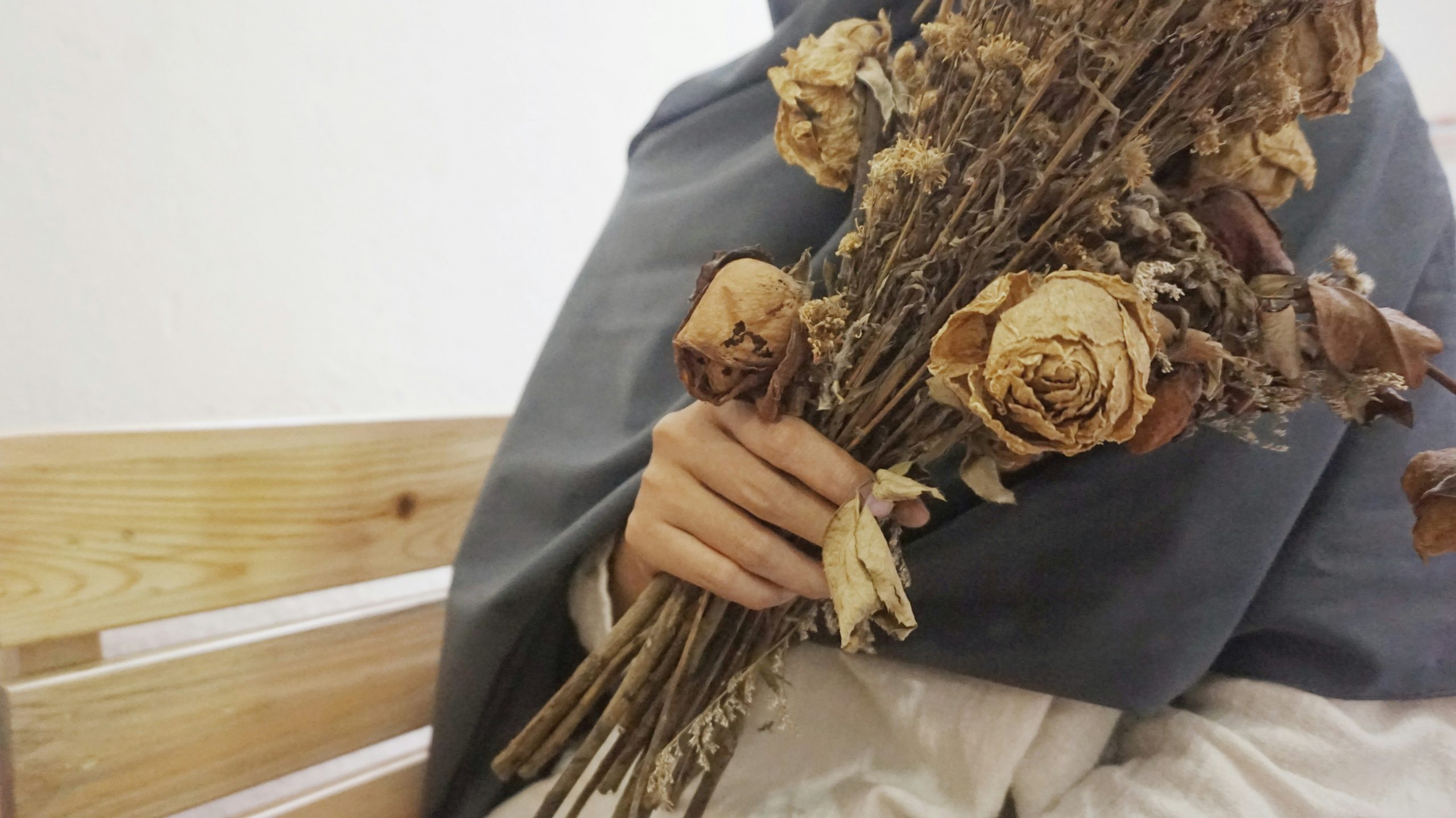
“The days are long, and the challenges are many, but they are interwoven with moments of joy.” [PC: Dila Ningrum (unsplash)]
Single parenthood was a path I had never envisioned for myself, yet here I am. The days are long, and the challenges are many, but they are interwoven with moments of joy; my daughters’ laughter, their milestones, and the deep love we hold for each other.My eldest, despite her grief, has shown a resilience that astounds me. We talk about her father often, sharing his jokes and remembering his wisdom. It’s our way of keeping his beautiful memory alive in our home. My youngest, too young to understand the loss, is now almost three years old. She is growing up healthy, cheerful, and looking more and more like him each day.
Each day begins with a dua’ for strength and ends with gratitude. Gratitude not only for what I still have, but also for what I have finally come to understand. I have learned that tawakkul, reliance on Allah  , is what steadies the heart. I have also realised that vulnerability is not a sign of weakness. It is a path toward resilience and unimaginable strength.
, is what steadies the heart. I have also realised that vulnerability is not a sign of weakness. It is a path toward resilience and unimaginable strength.
Life is a journey, a temporary stop on our way to the Eternal. The loss of Hanafi has made this reality clearer than ever. I am a traveler, as are we all. And while the pain of separation remains, knowing that he is now under the care of our Merciful Rabb brings me calm, and the hope of reunion in Jannah continues to sustain me.
Hajar’s story ends with the miraculous spring of Zamzam, a manifestation of Allah’s  Promise and Mercy. My story is still unfolding, but I know one thing for certain: My Rabb will never abandon us.
Promise and Mercy. My story is still unfolding, but I know one thing for certain: My Rabb will never abandon us.
If you are reading this and carrying your own burden of loss, know that you are not alone. Your pain is seen, your tears are counted, and your struggle is known by the One who created you. Trust in Him, even when the path is unclear.
As the Prophet Muhammad ﷺ said upon the loss of his son, Ibrahim  :
:
“The eyes shed tears, and the heart grieves, but we will not say except that which pleases Allah. Indeed, we are grieved by your departure, O Ibrahim.” [Sahih al-Bukhari 1303]
May Allah  grant us the strength to endure, the faith to persevere, and the hope to continue our journey toward Him.
grant us the strength to endure, the faith to persevere, and the hope to continue our journey toward Him.
اللهم أجرني في مصيبتي، واخلف لي خيراً منها
“O Allah, reward me in my affliction and replace it with something better.”
Related:
– My Dearest Fetus: Enduring Unimaginable Loss
– Sharing Grief: A 10-Point Primer On Condolence
The post My Rabb Will Never Abandon Us: A Personal Journey Through Love, Loss, And Tawakkul appeared first on MuslimMatters.org.
Gaza needs food and freedom
Senior faith leaders urge Starmer to tone down migration rhetoric
Exclusive: Christian, Muslim and Jewish representatives write to prime minister after ‘island of strangers’ speech
More than a dozen bishops and other senior Christian, Muslim and Jewish faith leaders have written to the prime minister after his “island of strangers” speech, urging him to use a more “compassionate narrative” about migrants.
The letter was sent to Keir Starmer after his speech on Monday, which preceded the publication of the government’s immigration white paper that has been widely criticised by migrant rights organisations and civil society groups.
Continue reading...Family still hopes to find “kind and beloved” son
Germany's love affair with Israel looks absurd
After 19 months of a genocidal war, several governments finally call for action.
UK doctor suspended over Gaza posts
Dr. Nadeem Haddadin-Crowe discusses witch hunts in the National Health Service prompted by politicians and Israel lobby groups.
Guardians Of Faith, Not Gatekeepers: Honoring The Work Of Muslim Student Organizations
“We know what happens when our youth enter these universities…” The speaker pauses, his tone shifting to one of grave concern. “There are… influences.” His meaningful glance sweeps across the room of parents. “Even in Muslim Student organizations, we must be vigilant about certain… activities.”
He leaves the specifics unspoken, allowing parental imaginations to fill the gaps with their worst fears. In the back of the room, young Muslims exchange knowing glances. Once again, their campus efforts (the dawn fajr prayers coordinated during exam weeks, the comprehensive mentorship systems developed for incoming Muslim freshmen, the tireless negotiations that secured permanent prayer spaces and halal dining options) are reduced to vague insinuations of moral compromise. The concerned nods from parents -who have never even visited these spaces- speak volumes about the power of suggestion.
The Subtle BetrayalThere exists a betrayal more subtle than outright rejection of faith. It operates within our own communities, powered by those who claim to protect Islam while undermining its future. It is the systematic dismantling of Muslim youth organizations under the banner of “moral vigilance.” While external forces challenge our faith, we fracture from within, transforming principles into weapons against progress. Have we forgotten the divine warning?
“O you who have believed, avoid much [negative] assumption. Indeed, some assumption is sin. And do not spy or backbite each other. Would one of you like to eat the flesh of his brother when dead? You would detest it. And fear Allah ; indeed, Allah is Accepting of repentance and Merciful.” [Surah Al-Hujurat; 49:12]
This betrayal is particularly devastating because it comes from those positioned as guardians of our tradition.
When young Muslims are already navigating hostile environments where their identity is questioned, their faith is misrepresented, and their very presence is sometimes unwelcome, they deserve safe harbors within their own community. Instead, they often face a second front of criticism from those who should be their strongest advocates.
Many critics speak as though our educational institutions and youth organizations represent existential threats to Islamic identity, despite evidence to the contrary. The reality? The overwhelming majority of Muslim students maintain their prayers, fast during Ramadan, avoid prohibited substances, and strive to live honorably despite immense pressures.
Terms like “haram” and “bidah” are deployed with devastating casualness, transforming spiritual concepts meant for careful scholarly application into blunt instruments for social control. This linguistic violence does not strengthen faith; it fractures it, creating unnecessary divisions where unity is desperately needed.
Celebrating Our Youth’s AchievementsWhat critics consistently overlook, whether through oversight or intention, is the extraordinary achievement these young Muslims represent. Beyond the noise of criticism stands remarkable evidence: vibrant MSA communities, transforming inhospitable campuses into sanctuaries of Islamic identity, Young Muslims nurturing high schoolers at their most formative age. These are not mere social gatherings but sophisticated institutions where Quran study deepens, dawah reaches seeking hearts, halal dining expands, and belonging flourishes in environments that often question their very presence.
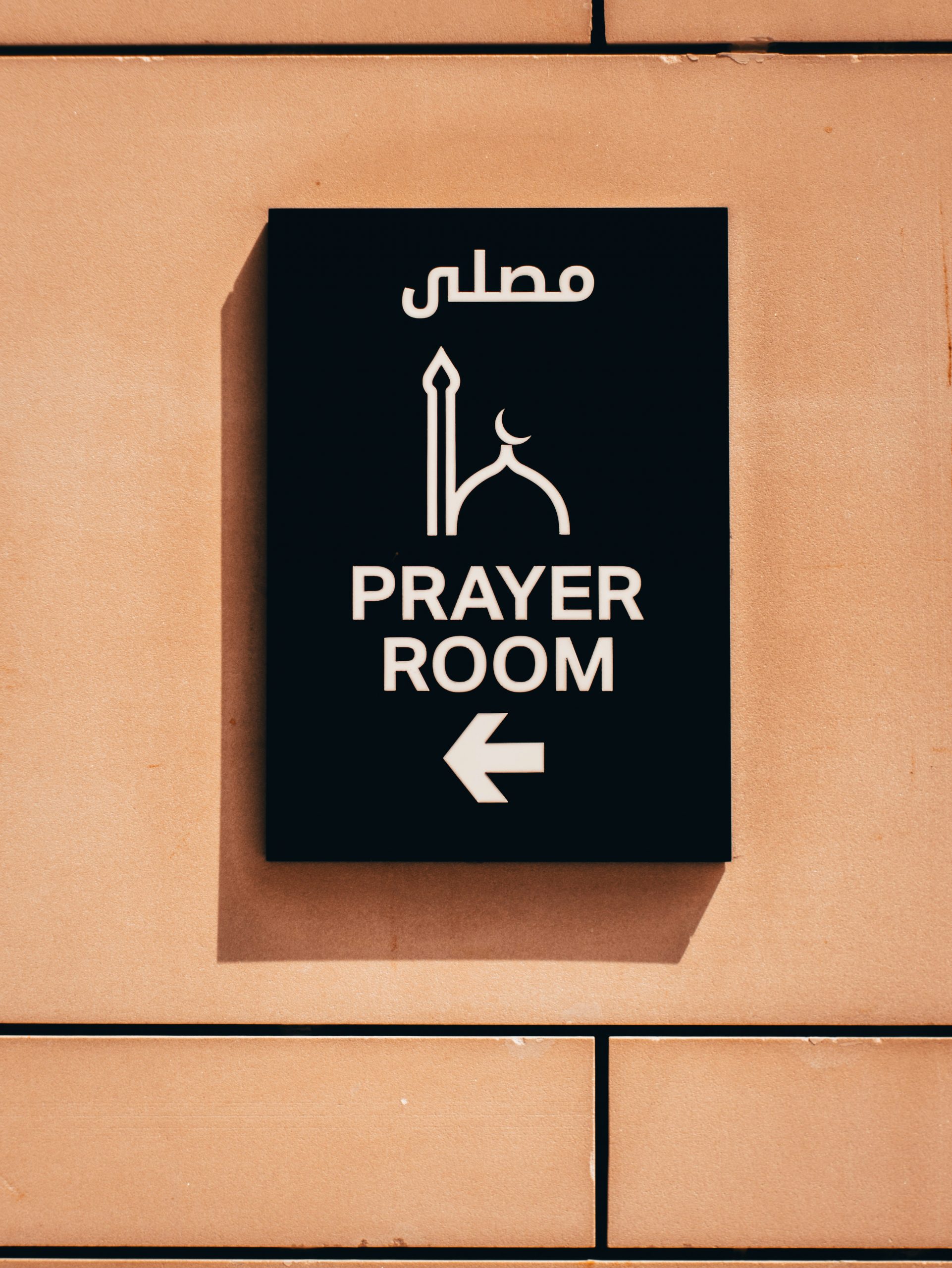
“These organizations provide essential lifelines that transform campus life for Muslim students.” [PC: Kiko Camaclang (unsplash)]
These organizations provide essential lifelines that transform campus life for Muslim students. Many establish vibrant spiritual rhythms by organizing regular congregational prayers, with some even coordinating fajr prayers at dawn, creating sacred spaces where students can gather amid hectic academic schedules. In some MSAs, you’ll find daily Quran halaqahs for recitation, while others host weekly dhikr sessions that nourish spiritual hearts, or organize Quran memorization groups where students support each other in preserving divine words. These aren’t merely social groups but often serve as spiritual sanctuaries where faith practices that might otherwise be abandoned in college find enthusiastic revival.During Ramadan, these organizations frequently become essential support networks, with some planning community iftars strategically scheduled around midterms to ensure no student breaks fast alone during stressful academic periods. What mainstream narratives miss is how certain student groups, despite crushing academic pressures, coordinate full eight-rakat taraweeh prayers, organize transportation for late-night qiyam prayers at local masjids, and maintain spiritual discipline while embodying the prophetic emphasis on community building, the very foundation upon which Islamic tradition thrives.
Beyond spiritual practices, many establish dedicated prayer rooms through persistent advocacy with university administrations, often after years of negotiations. Some organize interfaith dialogues that challenge Islamophobia, execute sophisticated charity and volunteering initiatives that benefit wider communities, and create comprehensive support systems for incoming Muslim freshmen navigating campus life. Some have established weekly “chai and chats” that build brotherhood and sisterhood, sustaining students through the isolation that often accompanies minority faith status.
Across campuses, these groups negotiate for halal food options in dining halls, establish collective funding systems for brothers and sisters experiencing financial strain, and create resources that benefit Muslims and non-Muslims alike.
The leadership pipelines, governance structures, and resource management in some of these organizations exceed the effectiveness of established Islamic centers operating with decades of donations and professional staff. These aren’t amateur efforts, but sophisticated institutions built by students who apply Islamic principles to create models of community that many masajid could learn from.
These Muslim organizations nurture spaces where Islamic identity is worn without apology. Hallways resound with confident “As-salamu alaykum” greetings, spoken not in hushed tones but with dignified assurance. Young men fulfill responsibilities requiring physical presence, Sisters lead with intellectual rigor and administrative precision while maintaining unwavering commitment to their values.
Beyond protecting identity, MSAs transform souls. Cultural Muslims, raised with little more than Eid celebrations and occasional prayers, discover in these spaces what their homes never provided: Islam as a living reality rather than inherited custom. Their peers demonstrate faith not as a burden, but liberation. For truth-seekers adrift in a sea of relativism, these organizations become islands of clarity where authentic Muslim youth, intellectually engaged yet spiritually grounded, embody an Islam that speaks directly to modern hearts.
This living dawah converts more souls than a lifetime of formal lectures ever could; More astonishing still is Allah’s  transformation of these newcomers into Islam’s most passionate advocates. Those who embrace shahada in these environments frequently become, within just months, the very speakers whose fresh perspectives move lifelong Muslims to tears, and some become activists whose principled civic engagement commands respect across campus. Having known both spiritual emptiness and fulfillment, these new Muslims bring unmatched conviction to their work. While critics obsess over minor infractions, Allah
transformation of these newcomers into Islam’s most passionate advocates. Those who embrace shahada in these environments frequently become, within just months, the very speakers whose fresh perspectives move lifelong Muslims to tears, and some become activists whose principled civic engagement commands respect across campus. Having known both spiritual emptiness and fulfillment, these new Muslims bring unmatched conviction to their work. While critics obsess over minor infractions, Allah  guides souls to eternal salvation through these imperfect but sincere communities. The critics’ fleeting words will vanish; the reward of those who guided others to goodness will remain forever, as our Prophet ﷺ promised: “Whoever guides someone to goodness will have a reward similar to the one who does it.”
guides souls to eternal salvation through these imperfect but sincere communities. The critics’ fleeting words will vanish; the reward of those who guided others to goodness will remain forever, as our Prophet ﷺ promised: “Whoever guides someone to goodness will have a reward similar to the one who does it.”
What critics consistently misunderstand, is the remarkable balance achieved in these spaces, where tradition finds harmony with contemporary realities without compromise. These students aren’t diluting their faith but revitalizing it through practical application, proving that Islamic principles thrive when embodied with sincerity rather than performative rigidity.
Civic CouragePerhaps most remarkable has been their civic engagement during watershed American moments. While others posted on social media or complained in private, these young Muslims mobilized thousands, educated communities, and shaped national conversations. From standing against the genocide of Palestinians to other humanitarian crises, they’ve demonstrated that Islamic values demand collective action.
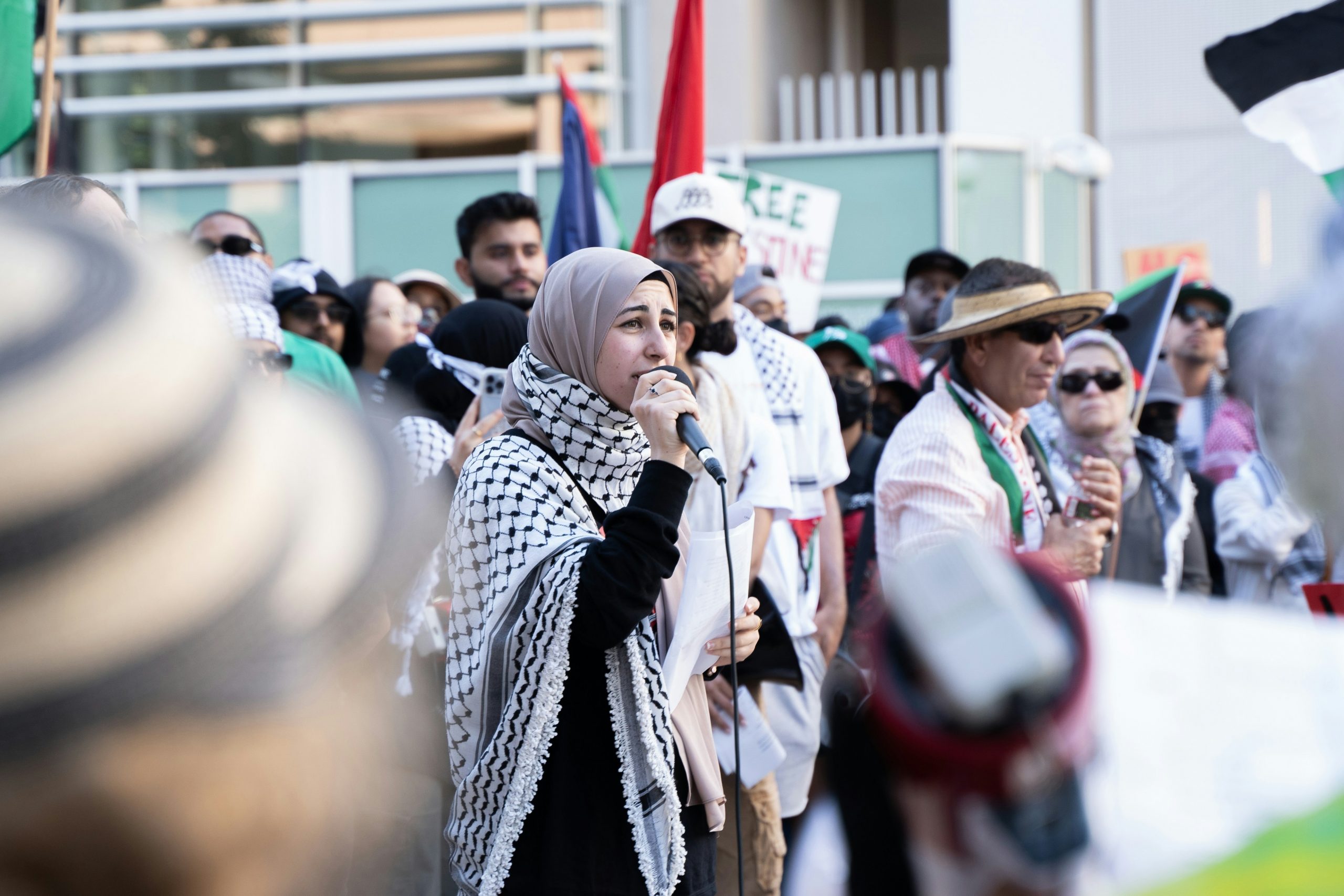
MSA-led civic engagement [PC: HasanMajed (unsplash)]
These young Muslims understand that the Islamic tradition has always been one of engagement, not isolation. The Prophet Muhammad ﷺ did not retreat from society but transformed it through active participation. Despite facing potential academic penalties and career repercussions, these students risked their futures by organizing campus sit-ins, educating peers about humanitarian crises, and boldly challenging institutional silence. They embody the Quranic principle:“And cooperate in righteousness and piety, but do not cooperate in sin and aggression.” [Surah Al-Ma’idah; 5:2]
The Hypocrisy of Selective StandardsThe hypocrisy is striking. The same speakers who condemn young Muslims for gathering in cafes after taraweeh move comfortably through mixed gatherings at conferences and fundraising events. They enforce rigid standards specifically where young people gather, while granting themselves contextual flexibility. Our Prophet ﷺ warned: “It is enough evil for a person to belittle his Muslim brother.” The Quran cautions:
“O you who have believed, why do you say what you do not do?
Great is hatred in the sight of Allah that you say what you do not do.” [Surah As-Saff; 61:2-3]
This rush to judgment stands in stark contrast to our scholarly tradition. The great Imam Malik ibn Anas demonstrated true wisdom through intellectual humility. When asked why he would answer some questions with ‘I don’t know’ despite his vast knowledge, he replied: “Nothing destroys knowledge more than when a scholar is too ashamed to say ‘I don’t know.'” Yet today, self-appointed guardians appear to know everything about everyone’s failures, proclaiming judgments where even the greatest scholars would hesitate.
Constructive Criticism vs. Destructive CondemnationThese organizations deserve scrutiny -all Islamic institutions do-, but criticism must come with dignity and wisdom. When concerns arise, let them be delivered with the adab of our tradition: privately where possible, with specific remedies rather than vague condemnation, and wrapped in recognition of the broader good being accomplished. The Prophet ﷺ corrected without humiliating, guided without destroying, and nurtured growth rather than cultivating shame.
True guardianship means standing beside these young Muslims as they navigate complex realities, offering wisdom when asked and support throughout. This approach honors both the critic and the criticized. As Imam al-Shafi’i wisely noted: “I have never debated anyone without praying that Allah would cause the truth to flow from his heart to mine, and from my heart to his.” This spirit of mutual respect preserves the dignity of our youth while allowing their organizations space for growth.
A Message to ParentsParents, consider carefully. The vast majority of Muslim youth maintain their faith through college years and beyond. They pray. They fast. They avoid prohibited substances. They strive for halal relationships.
Your greater concern should be their mental well-being in environments often hostile to their identity. Fear the consequences of isolation far more than the phantom threat of moral corruption. By fueling suspicion against these organizations, you may sever them from the very support system they desperately need. Remember Allah’s  Command:
Command:
“And hold firmly to the rope of Allah all together and do not become divided.” [Surah Ali ‘Imran; 3:103]
A Call for Prophetic WisdomThe Prophet Muhammad ﷺ, upon seeing a man being pursued for a sin, silenced those chasing him, saying: “You have not helped him with regards to Allah, nor have you helped him against his own self.” Where is this prophetic wisdom today?
What these youth represent is not merely the future of our community; they are its present. They are not Muslim leaders in training; they are Muslim leaders now, addressing challenges their elders often cannot see or understand.
ConclusionLet those who rush to condemn our young people remember the words of Imam Ali: “Do not look at who speaks, but look at what is said.” The achievements of Muslim student organizations speak volumes, creating leaders, maintaining Islamic identity in challenging environments, and building sustainable structures for faith to flourish.
To those building these communities despite criticism: Your work stands as testimony. Every student who finds their way to Allah  through your efforts is the true measure of success. “Indeed, Allah will not change the condition of a people until they change what is in themselves.” [Surah Ar-Ra’d; 13:11]
through your efforts is the true measure of success. “Indeed, Allah will not change the condition of a people until they change what is in themselves.” [Surah Ar-Ra’d; 13:11]
The sustainable future of Islam in Western contexts depends not on perfect adherence to every detail, but on building robust communities where faith can grow. The Prophet ﷺ said: “Make things easy and do not make them difficult, give glad tidings and do not repel people.”
Perhaps it is time we followed his example in how we treat those building the future of our faith.
Related:
– From The Chaplain’s Desk: Valuing And Nurturing Faith On Campus
– Quranic Verses For Steadfastness For The Valiant Protesters On Campus
The post Guardians Of Faith, Not Gatekeepers: Honoring The Work Of Muslim Student Organizations appeared first on MuslimMatters.org.
A long-awaited reunion in Amman
May Ruaa’s memory be forever green
Moonshot: A Short Story [Part 3] – The Traits Of The Noble
Cryptocurrency is Deek’s last chance to succeed in life, and he will not stop, no matter what.
Previous Chapters: Part 1 | Part 2
“If you want to find out what a man is… give him power. Any man can stand adversity — only a great man can stand prosperity.” – Robert G. Ingersoll
“Anything I do to elevate myself in the eyes of others is hollow.” – Wael Abdelgawad
Tentacles Slithering UpAs he walked out of the hospital, the Jumu’ah prayer alarm sounded on his phone. Man, he’d forgotten it was Friday. The crypto world operated every moment of every day and night, so one day was no different from another. He’d often missed Jumu’ah when trading crypto, but he wanted to attend today. He felt like he’d been a prisoner in a tiny cell for five years, and had just been liberated. Plus, he owed it to Allah, to thank Him for this long-awaited success.
It was too late to go to Masjid Madeenah, where he usually attended. Instead, he caught an Uber to Masjid Umar, the mostly Arab masjid in north Clovis. He wasn’t fond of Masjid Umar. The community was insular and wealthy, and although Deek himself was Arab, he never felt like he fit there.
In the Uber, he checked his crypto wallet. Solana was up 15%, and New York Killa was up 29%. His net worth was now $80 million. If he’d kept the bulk of the New York Killa, rather than selling, he would have much more. But what did it matter? He would never be able to spend $80 million anyway.
 On impulse, he cashed out some of the Solana and initiated another transfer to the joint bank account, sending $80,000 this time. His only regret was that these funds had not yet arrived in the account. He would have liked to go shopping before prayer, so he could show up wearing something snazzy. An Armani suit maybe, and Italian leather shoes. And perhaps some jewelry and a new haircut. As it was, he was wearing his same old jeans and Hawaiian shirt that he wore every day.
On impulse, he cashed out some of the Solana and initiated another transfer to the joint bank account, sending $80,000 this time. His only regret was that these funds had not yet arrived in the account. He would have liked to go shopping before prayer, so he could show up wearing something snazzy. An Armani suit maybe, and Italian leather shoes. And perhaps some jewelry and a new haircut. As it was, he was wearing his same old jeans and Hawaiian shirt that he wore every day.
Deek was aware that all these thoughts – divorcing Rania, keeping the money secret, showing off for the people – were like tentacles slithering up out of a dark sea that swelled inside him. He was not a fool. He knew how Shaytan could whisper in a man’s ear. When he was a boy in Iraq, he’d learned the Quran at his father’s feet, as well as studying Hanafi fiqh with the local shaykh. He had a good understanding of Islam and had not forgotten it.
The CrusherHis family came to the USA when he was nine years old. He did well in school, but after high school, he rebelled and went to art college, and became a fine art painter, much to his father’s chagrin. He was talented, and put on a few gallery shows. But when he married Rania he gave that up and took a more respectable job teaching elementary school. Until, sick of laboring in the lower middle-class echelon, tired of being poor, he quit that in turn to risk everything on the crypto revolution.
His parents were both gone now, which was a blessing in a way, as they had not been around to see what a failure he had become.
He still remembered much of the Quran he’d learned as a youth. Obviously he still knew Juz ‘Amma, and could recite Surat Al-Humuzah:
Woe to every backbiter, slanderer,
who amasses wealth and counts it ˹repeatedly˺,
thinking that their wealth will make them immortal!
Not at all! Such a person will certainly be tossed into the Crusher.
And what will make you realize what the Crusher is?
˹It is˺ Allah’s kindled Fire,
which rages over the hearts.
It will be sealed over them,
˹tightly secured˺ with long braces.
The surah painted a stark portrait of an evil man hunched over his money, counting it obsessively. Someone who, perhaps, had accumulated wealth through the cheap labor and suffering of others, or a leader who stole the resources of his own people. Such people crushed the spirits of others in order to enrich themselves, and so Allah would crush them in turn.
That was justice. Deek did not consider himself such a person. He’d earned his money lawfully and through his own study, dedication, and sleepless nights. He hadn’t robbed anyone.
Yet still he was frightened. He had to find a way to avoid being eaten alive by this wealth.
The Blockade of Bani Hashim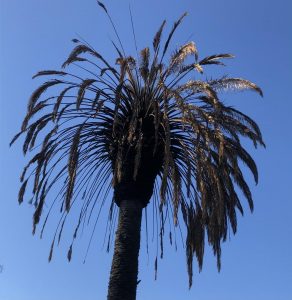 Masjid Umar was encircled by tall palm trees, and as the Uber pulled up Deek saw that three of them had been torched. They still stood, but they’d been badly burnt. The whole area stank of charcoal and ash. He wondered what had happened, but there was no time to speculate, as he was late. He hurried into the masjid.
Masjid Umar was encircled by tall palm trees, and as the Uber pulled up Deek saw that three of them had been torched. They still stood, but they’d been badly burnt. The whole area stank of charcoal and ash. He wondered what had happened, but there was no time to speculate, as he was late. He hurried into the masjid.
The prayer area was small and crowded. There was no room to sit, so Deek stood at the back. The Imam told the story of the mushrikeen’s boycott and blockade of Bani Hashim during the Makkan period, and the extreme hardship and even starvation it had caused. The Imam spoke about how this boycott ended. Namely, five of the disbelievers, who in spite of their rejection of Islam were fair men, agreed to speak against this injustice.
At the same time, the Prophet  had a dream in which he saw that the agreement the mushrikeen had signed to impose the boycott had been destroyed. The document had been stored in the Ka’bah, and the Prophet
had a dream in which he saw that the agreement the mushrikeen had signed to impose the boycott had been destroyed. The document had been stored in the Ka’bah, and the Prophet  saw that all of the paper had been eaten by ants, except for the words Bismillah.
saw that all of the paper had been eaten by ants, except for the words Bismillah.
It was a fascinating story, and was yet another example of how Allah never abandoned the believers. Though the Prophet  and his family and followers had gone through a period of extreme hardship, Allah the Most High engineered events that brought them out of hardship, though not immediately, as the most terrible blows of all still awaited the Prophet
and his family and followers had gone through a period of extreme hardship, Allah the Most High engineered events that brought them out of hardship, though not immediately, as the most terrible blows of all still awaited the Prophet  . His wife, Khadijah, and his protector, Abu Talib, both died. With Makkah having become unsafe for him, he walked to Ta’if to preach to the leaders there, but they rejected him and ordered him stoned.
. His wife, Khadijah, and his protector, Abu Talib, both died. With Makkah having become unsafe for him, he walked to Ta’if to preach to the leaders there, but they rejected him and ordered him stoned.
It was only after all of this that the people of Madinah began to embrace Islam, and the hijrah began – finally ending the oppression of the Makkan period.
To Be SincereDeek felt that it was destiny that he had come to this particular masjid today, as he needed to hear this message. Problems end, he thought, but not immediately. Sometimes you go from the frying pan to the fire, and only then, if you are patient, do you escape to the garden and the cool river running through it.
I must do better, he thought. I must not let the wolf eat me alive. I mustn’t lose myself. I have to do good with this money. I have to be sincere.
These thoughts were like an intellectual exercise, however, or like trying to solve a problem of color or texture with a painting. Wasn’t it all subjective? He had no idea what it meant to be sincere with money, since he’d never had money. All he could think of was that he should donate. Donate to the poor, orphans, the masjid, and so on.
The opportunity presented itself sooner than expected. The salat ended, and people began to file out of the masjid. Deek found a chair to sit in to put his shoes on. He’d gained a lot of weight during the crypto years, and it was difficult to bend over enough to put on socks and shoes. When he was finally ready to go, most of the crowd had dissipated.
A Detested CountrymanOutside, a group of five middle-aged brothers stood beside the burnt trees, gesturing and talking animatedly. Two of them he recognized immediately. One was Dr. Zuhair, a classically handsome Egyptian engineer with a thick mustache, who looked like he could play Gamal AbdelNasser in a movie. Zuhair sat on the boards of many local Islamic organizations and was said to be very wealthy.
The other man he recognized was Dr. Ajeeb, the former principal of the Islamic school Deek’s children had attended for many years. The tall, thin Iraqi wore a loose black suit with a white shirt and red tie, which made him look like a flagpole from which the Iraqi flag hung limply. His face was thin and brown, while his teeth were cigarette-stained.
Deek remembered now. Ajeeb had been fired from the principal job a few years ago and was now the program director for this masjid. He was not a medical doctor, but rather had a PhD in Islamic Sciences from the Islamic University of Najaf in Iraq.
In spite of being countrymen, Deek and Ajeeb had never gotten along. Back when his kids had attended the school, Deek had complained many times that the Islam, Quran, and Arabic programs were hidebound by Middle Eastern tradition. Everything was rote memorization, and the teachers were recent immigrants who could barely speak English. Some still thought they could discipline students by shouting or hitting their hands with rulers. It was disgusting.
Furthermore, the only organized sport at the school was soccer, rather than the baseball, basketball, or American football that were more popular in this country. It was as if they had used a thousand cranes to lift a school out of the Middle East and drop it into the USA. Deek would have pulled his children out, except the thought of sending them to public school terrified him. He himself had attended an American public school, and he knew what a moral cesspool it was.
Deek had actually gone to the board and complained about Ajeeb, but they hadn’t been interested. Deek was poor and could barely pay the monthly school fees. He certainly was not a financial supporter or donor. His opinion carried little weight.
He’d been happy when Ajeeb was fired, but disappointed that one of the local masjids hired him.
An Offer To HelpDeek walked up to Ajeeb and put a hand on his shoulder. “Doctor,” he said. “What happened here?”
Ajeeb turned and smiled thinly. “Brother Deek. Someone tried to burn the masjid.”
“Who?”
“We don’t know.”
“Doesn’t look like they tried very hard. These trees aren’t even close to the building. Someone wanted to make a statement, maybe. Or kids.”
Ajeeb made a tut-tut sound with his tongue. “This is very serious, brother. It’s not for joking.”
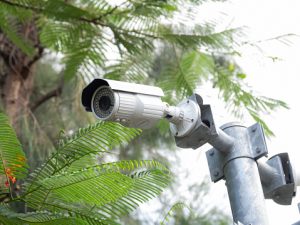 “Why,” demanded a portly Egyptian with curly hair and thick glasses, “aren’t there security cameras?”
“Why,” demanded a portly Egyptian with curly hair and thick glasses, “aren’t there security cameras?”
“We have been meaning to do it,” Ajeeb replied. “We didn’t have the funds.”
“I could help with that,” Deek offered. “I’ll cover the whole thing, cameras and installation.” It felt incredibly strange to say these words. A voice inside him, representing a persona still stuck in the past – and in his case, the past meant yesterday – protested, What are you doing? You can’t afford that! Rania will kill you. Having money was a strange sensation, like being alone in a room for forty years, then suddenly finding a beautiful woman sitting on the bed with you. It would take him a while to believe it was true.
Ajeeb turned only partway to face him and held up a hand. “This will take more than your $100 donation, ya Deek. But thank you.”
The portly brother snickered. A few other men in the group smiled. Only Dr. Zubair did not share their amusement. He frowned disapprovingly at Ajeeb, but said nothing.
An Incident From The PastDeek felt himself go cold with rage. Ajeeb’s mocking comment was a reference to an annual school fundraiser several years ago. It was a banquet, with almost 500 local Muslims in attendance. Ajeeb had the microphone and was asking for $5,000 donations, having worked his way down from $25,000. Teenage boys and girls walked the floor with pledge cards, ready to take pledges. Deek, who was there with Rania and the girls, waved a girl over to his table. Most donors filled out the pledge cards with promises of large donations. Deek couldn’t do that, but he always tried to give something, so he handed the girl a hundred dollars in cash.
Apparently the girl was confused, not knowing what to do with the cash. Dr. Ajeeb said, “I’m looking for one more $5,000 donation. Ask yourselves what you can spend for the future of your children and this community.” At that exact moment, the girl, still standing beside Deek, raised her hand and called out, “One hundred dollars?” A few people laughed, while Ajeeb waved an irritated hand toward a table beside the dais, where three college students were collecting the pledge cards.
It was humiliating. Later, as he drove the family home, Rania rubbed his shoulder and assured him that the girl had not intended to embarrass him. But as she said it, she smiled. Deek never forgot that smile. He could forgive people their trespasses against him, though not easily. But he was not the type to forget.
A Dark FantasyDeek stood beside the burnt trees, beside these men, but not among them. The men stood in a circle and did not move to admit him. The nonverbal message was clear: You are not our equal. Let the important people talk. A vision came to Deek’s mind. Ajeeb would be walking at night, perhaps out for an evening stroll after dinner. Deek would steal up behind him and sedate him with a chloroform-soaked cloth. He would drag Ajeeb into a van, drive him down to the San Joaquin River, and drown him. The river would carry his body away, and it would never be traced back to Deek.
It was only a dark fantasy. He’d had such thoughts many times, about various people, but would never do it. But what could he do in the real world to spoil things for Ajeeb and make his life harder? He was a man of resources now. Money talked, and BS walked.
The Dashing Dr. ZuhairHe approached Dr. Zuhair and took his arm. The man’s muscles were firm beneath Deek’s hand. MashaAllah, Zuhair was probably sixty-five years old, yet Deek could picture him in a camo vest and carrying an AK-47, pursuing bandits in the Sinai. Deek led the handsome man away from the group and toward the back wall of the parking lot, which butted up against a residential neighborhood on the other side. Orange and lemon trees stretched their branches over the wall.
Deek said, “Doctor, are you on the board of this masjid?”
“Yes,” Zuhair replied cheerily. “I’m the board president. Why?”
“I’m serious about paying for the cameras. Actually, I want to make a large donation to the masjid.”
“Pardon my frankness,” Zuhair said, “but how can you afford that? Don’t take me wrong, I respect everyone regardless of financial status, but you are not known to be wealthy.”
Deek pursed his lips, considering. If he wanted to be taken seriously, he would have to give something up.
“Are you familiar with cryptocurrency?”
“I own a little Bitcoin. I am far from an expert.”
“Well, I am an expert. And I have done very well with it, alhamdulillah.”
“Okay… How much would you like to donate?”
Deek licked his lips nervously. “One million dollars.” Even to his own ears it sounded like a jest, so he was not surprised when Zuhair laughed, punched Deek’s shoulder, and said, “Okay, you got me brother. That was a good joke.” Zuhair reached up to one of the overhanging branches, snagged an orange, and began to peel it.
Providing Proof “How is your family these days?” Zuhair asked as he popped an orange wedge into his mouth. “You have two daughters, yes? They attended school with my daughter when they were young.”
“How is your family these days?” Zuhair asked as he popped an orange wedge into his mouth. “You have two daughters, yes? They attended school with my daughter when they were young.”
“They’re good, alhamdulillah.”
A pigeon landed in the parking lot and strutted by, cooing.
“I’ll show you something,” Deek said. “Give me a minute. But I need your word that this stays between me and you.”
“Okay, no problem,” Zuhair said, eating more of the orange. “I give you my word. This orange is amazing, mashaAllah. You should have one.”
“Aren’t those the neighbor’s trees?”
“Yes, but the branches are on our side. They can’t pick them over here.”
Deek took out his phone and held it at an angle where Zuhair could not see the screen. Opening the Phantom app, he saw that Solana was holding steady, but Killa was up a bit more. His balance was 81 million and change. He quickly created a new wallet and transferred $3 million in Solana to it. There was no point in letting Zuhair see the full extent of his wealth. That was not for anyone to know – not the government, nor even his wife.
The whole process took only a minute. Then he turned the phone to show Zuhair the screen.
Zuhair gave a long, low whistle. “You made three million dollars in crypto. That is very impressive, brother. You should teach me how to do that!” A sly look crept across his face. “Tell the truth. Is this a prank? Am I on a hidden camera show?”
“It’s real. And I want to donate one million dollars.”
Two Conditions“Allahu Akbar!” Zuhair tried to clap his hands but ended up clapping the orange. “This is wonderful. You are giving one-third of your wealth. That is so generous.”
“Yeah. I guess so.”
“Allah barik feek, may Allah bless you. There are many things we can do with this money. We have been wanting to build a proper basketball court for the youth, and an outside wudu’ area for when the main building is locked, and -”
“I have conditions, though.”
Zuhair lifted an eyebrow. “Most people do not impose conditions. They donate fee sabeel-illah.”
“Most people don’t donate a million dollars.”
“True.”
“I want a seat on the board, and I want Ajeeb fired.”
Zuhair shook his head and waved his hand dismissively. “The position on the board is not impossible for a donation of this magnitude, but as far as Doctor Ajeeb, this request is beneath you. It is inappropriate. Even if I already wanted to fire him, I would not do it for money.”
“I’m giving you a million dollars.”
“You could give a hundred million, I would still say no. It’s a matter of integrity. We simply don’t do things that way. Please. Just donate the money with a pure heart, with no conditions. It will bring you great rewards from Allah.”
Deek glared. He was pretty sure that if he gave a hundred million, Ajeeb would be out on his skinny behind in a hot minute. Everyone had a price. It sounded like Zuhair already wanted to fire the man anyway. So what was this talk of integrity? As if Deek was trying to corrupt him somehow.
The Traits of the Noble“What if I make it a million and a half?”
“Wonderful, ma-sha-Allah.” He pocketed the orange peels and reached up to pick another. “SubhanAllah. These oranges are so juicy.”
“But,” Deek said pointedly, “with the same conditions.”
“Then no.”
Deek’s voice rose. “What if I buy the whole masjid then? I could do whatever I want after that.”
Zuhair laughed softly. “You’d need a lot more than three million for that.”
“I have a lot more than three million.” As soon as he said this, he chastised himself for letting his ego get the better of him.
“Ah.” Zuhair wagged a finger at Deek. “It’s clever to be discreet with your assets. But still no. The masjid belongs to a non-profit organization. You cannot buy a non-profit org, there’s no provision for it under the law. It’s an interesting intellectual problem, though. You could try to buy the organization’s assets if they were willing to sell. As I said, you could perhaps negotiate for a seat on the board if you donated enough. Or you could always start your own masjid.”
“That’s not the point. Ajeeb is not a good person. He’s not good for the community.”
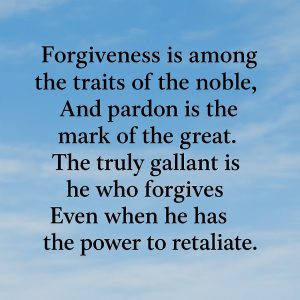 Zuhair sighed as if Deek were a recalcitrant pupil, then ate another orange wedge. “There is a poem,” he said between bites, “by Mufti ʿAbd al-Latif bin ʿAli Fathallah. He was a Lebanese poet from the eighteenth century. He wrote:
Zuhair sighed as if Deek were a recalcitrant pupil, then ate another orange wedge. “There is a poem,” he said between bites, “by Mufti ʿAbd al-Latif bin ʿAli Fathallah. He was a Lebanese poet from the eighteenth century. He wrote:
العَفوُ مِن شِيَمِ الكِرامْ
وَالصّفْحُ مِن شَأْنِ العِظامْ
وَأَخُو الشَّهامَةِ مَن عَفا
عَن قُدْرَةٍ عَلَى الانْتِقامْ
“That means -”
“I understand it,” Deek broke in. He recited:
“Forgiveness is among the traits of the noble,
And pardon is the mark of the great.
The truly gallant is he who forgives
Even when he has the power to retaliate.”
Zuhair nodded, impressed. “Very good.” He reached up and plucked another orange from the tree, and held it out to Deek.
Forgiveness did not come easily to Deek. His homeland was a nation of ancient feuds and brutal dictators. Even though he’d come to America quite young, the scorching blood of his people blew through his veins like the desert winds. Or maybe that was a cop-out. Maybe he was fully capable of being a better man. But did he want to? He wasn’t sure. Money was what he had always craved, and he had it now.
Without a word, and without taking the proffered fruit, Deek turned and walked away. He’d tried to do the right thing. He’d tried to give away a million and a half dollars, and they didn’t want it. How was he supposed to use his money for good when the people on the other end wouldn’t cooperate? He was done with that. It was time to think of himself and his own needs. Everyone else could get out of the way, or get run over.
***
[Part 4 will be published next week inshaAllah]
Reader comments and constructive criticism are important to me, so please comment!
See the Story Index for Wael Abdelgawad’s other stories on this website.
Wael Abdelgawad’s novels – including Pieces of a Dream, The Repeaters and Zaid Karim Private Investigator – are available in ebook and print form on his author page at Amazon.com.
Related:
The post Moonshot: A Short Story [Part 3] – The Traits Of The Noble appeared first on MuslimMatters.org.
Did immigration really cost Labour these elections?

A little over a week ago, in council elections across the UK and a parliamentary by-election in a historically safe Labour seat, the so-called Reform UK party, whose leader is Nigel Farage who previously ran the Brexit Party and before that was leader of UKIP and is notorious for bringing everything down to immigration, gained control of a number of provincial county and unitary councils which neither that party nor its predecessors have ever done before, as well as gaining the seat of Runcorn and Helsby on the outskirts of Liverpool from Labour, a by-election triggered by the resignation of the old MP who was convicted of assaulting a constituent in the street last October. Keir Starmer, the prime minister, penned a piece for the Times (paywalled, but archived here) which contains a lot of platitudes but very little substance other than a warning not to rip up fiscal rules and a mention of “reforming the out-of-control benefits bill left by the previous government” which started its period in office with an attack on disabled people’s allowances, but a major response has been that Labour should focus more on “stopping the boats” than on anything that might improve anyone’s standard of living, least of all the threat of cuts to disability allowances, something Labour freely condemned when they were in opposition and the Tories were doing it.
One of the loudest Labour MPs favouring an over-emphasis on immigration is Jonathan Hinder, a former police inspector who is now MP for Pendle and Clitheroe in Lancashire, one of the counties Reform gained control of (from the Tories) last week. His Twitter feed is full of “culture war” talking points, accusations of Labour being dominated by a “liberal elite” out of touch with Labour’s ‘traditional’ (read white) working-class base. Hinder wrote an article for the Daily Telegraph, a paper heavily associated with the Tory party and probably read by few working-class people, which starts with a claim that “the engines of the liberal establishment are revving up to explain why Reform’s success is not down to the one thing we know it definitely is: immigration”. He makes a brief statement of three examples of his support for what is commonly thought of as Labour policy, but then proclaims that “immigration is fundamentally an economic issue as much as it is anything else, and working-class people are generally the losers”. He demands that Labour pursue a “net-zero” migration goal, of one person entering for one leaving. He has also called for ‘reform’ of our human rights rules on the basis that a number of deportations have been blocked on “right to family life” grounds, as if the HRA did not guarantee rights to British citizens also (for example, the right of disabled people to live in their own homes rather than institutions).
There is a tendency for ‘populist’ right-wing politicians to talk of immigration, and sometimes ‘identify’, as codewords for race. Judging by Hinder’s recent posts, I suspect the same is true of him. When the Telegraph reported that an 18-year-old Muslim council candidate won a seat on Burnley after giving an interview to PoliticsHome in which she advocated separate public spaces for women, such as gyms, because Muslim women were not comfortable sharing spaces with men, he proclaimed: “we have to put our ‘cultural sensitivities’ in the bin and sort this out. Intolerable”. He also retweeted someone who called this “proper sectarian stuff”. Two weeks earlier, when the Supreme Court gave its ruling on the meaning of ‘woman’ in British equality law (i.e. that it excluded trans women), he gave it his enthusiastic support, sharing among other things Blue Labour’s tweet calling it a “common sense and definitive ruling” based on “biological reality”. This ruling was partly about the circumstances in which one sex can be discriminated against, such as in crisis spaces such as women’s shelters and rape counselling centres, as well as more mundane women’s facilities such as toilets and, yes, gyms. But as soon as Muslim women want spaces away from men, this becomes ‘intolerable’.
An important aspect of these results that has been glossed over in the debate over what lesson Labour should learn from them is that the biggest loser in terms of seats was the Tory party who lost 674 council seats in the authorities in which elections were held (which was by no means all of them) compared to Labour’s 187. Reform gained 677 (from nothing), the Lib Dems gained 163 and the Greens 44. Many of the county councils were rural counties whose urban centres have been excised to unitary authorities since the late 1990s: Nottingham, Leicester and Derby are all unitary, and aren’t governed by the new Reform (or Reform coalition) county councils. The Lib Dems also gained control of three councils: Oxfordshire, Cambridgeshire and Shropshire (the last from the Tories, the other two from hung councils), while both Labour and the Tories gained no councils between them. The dissatisfaction with Labour is clear, but what also appears to be happening is that the former Tory vote is moving to Reform, and that depending on the performance of Reform councillors around the country, Labour at the next election may not have the advantage of a divided Right anymore. It has been reported that many candidates stood for Reform not expecting, or even wanting, to win and have no idea how they will juggle their council commitments with work. How this situation will be resolved remains to be seen, but it could result in some quicker than expected council by-elections.
But as for why Labour lost so badly in places they should have won, just a year into a Labour government, perhaps immigration played a part but there is no denying that people are angry at Labour continuing Tory policies of targeting the welfare system and those who need the support it provides while spouting rhetoric about “working people”. Imposing means-testing on winter fuel payments is pure political folly, even if a lot of the recipients can afford it, because pensioners are far more likely to vote than younger people, but targeting disabled people who bore the brunt of fifteen years of Tory austerity policies and the demonisation that went with it, behaving as if even more people are getting support to live with disability who “don’t need it” than the Tories claimed, simply betrays everything many of us thought Labour stood for. Labour have touted reforms (read cuts) to PIP (Personal Independence Payment) as a means of getting people back to work; PIP is not an out-of-work payment but rather a way of meeting the cost of being disabled, by paying for things like wheelchairs, vehicles, adapted computers and software and the like. By continually harping on the virtues of work, they ignore the fact that many disabled people could not work reliably because their condition requires medical attention often, because of relapses or crises; it ignores the fact that a lot of workplaces are physically inaccessible to wheelchair users and many employers are unaccommodating, even if the job could be done by a disabled person.
When Kamala Harris lost the US presidential election last year, some of her supporters blamed the loss on ‘woke’ or her perceived closeness to trans rights, despite these issues having been present four years ago when Joe Biden won. All the immigration issues we have now were present less than a year ago when Keir Starmer won a large majority in parliament, and progressive parties won a combined majority of the popular vote. What’s changed is Labour’s stance towards pensioners and the disabled. The people insisting that the turnaround could only be because of immigration are those who already have an anti-immigration bias. Labour have to understand that if they do not serve the needs of the working class, Reform will step in and cater to the prejudices of some of them. They cannot beat Reform at their own game because Reform will always proclaim that it is not enough or find another scapegoat. Labour need to get to work at repairing the damage caused by fifteen years of Tory government, restoring the fabric of society — social care, social housing, youth clubs, libraries, schools — rather than boasting that they will make people’s lives harder, not easier. They have a substantial majority in parliament and four more years to make a positive change. If they spend their time making it a meaner place with more clampdowns on disability benefits and work visas, they will produce the conditions for Reform to sweep to power in 2029.
Possibly Related Posts:
- Axel Rudakubana is guilty, and nobody else
- They weren’t protests
- The ‘elitism’ of mere thought
- Hong Kong migrants: where will they live?
- Essex truck tragedy: why the driver is probably innocent
On Motherhood: Finding Fortitude In The Prophet Muhammad’s Teachings
Mom, Anne, Mutti, Daye – I have said “mother” in all of the four languages I grew up with.
Yet, it was only after I became a mother myself that I truly understood the depth and the meaning of what motherhood entails. It continues to be the most transformative experience of my life. Becoming a mother has been the most physically, emotionally, mentally, and spiritually challenging transformation of my human existence. It seems as mothers are growing, guiding, and nurturing a human being, they equally evolve and change forever through their children. For those who are not parents, the capacity to nurture and guide the next generation remains within every human’s nature.
Motherhood, with all of its joys, can also be a terribly lonely and sad experience: the pain and exhaustion of your body, the postpartum blues and mental strain, the sleepless nights, the tears, the constant worries and the never-ending questioning and guilt to make sure that you give your best to this new human being. As a society, we acknowledge and honor the hard and selfless sacrifices of mothers, especially on Mother’s Day. Yet, we still fall short in offering holistic support and care in many areas of life.
In those moments in which I feel alone and overwhelmed by the endless demands of motherhood, I turn to the spiritual resources of my Muslim faith that continue to sustain my heart and strengthen my soul. Our Prophet Muhammad’s  teachings on maternal care and his own expression of love towards his mother even after her death offer me comfort in times of distress. A few of them are particularly close to my heart:
teachings on maternal care and his own expression of love towards his mother even after her death offer me comfort in times of distress. A few of them are particularly close to my heart:
Every motherly hardship is rewarded as highlighted in many Qur’an passages that were delivered by Prophet Muhammad  to his community:
to his community: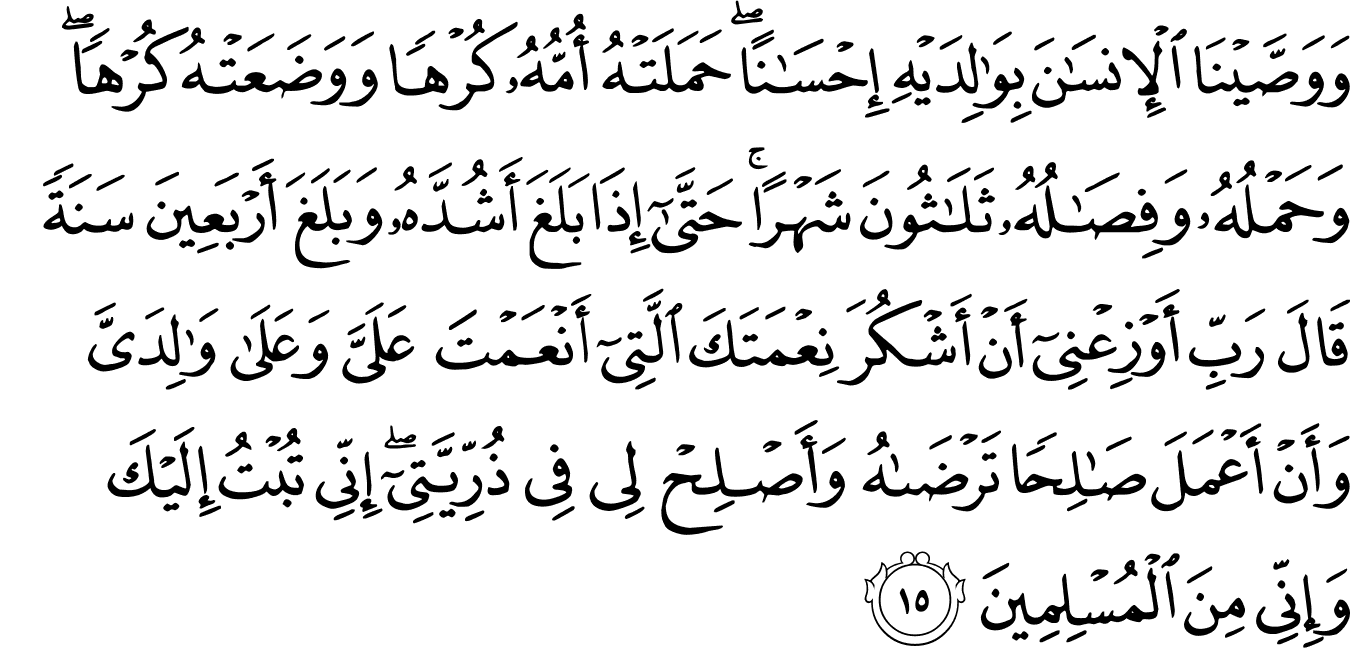
“We [God] have commanded the human being to be good to his parents: his mother struggled to carry him and struggled to give birth to him – his bearing and weaning took a full thirty months. In time, when the child reaches their prime at the age of forty, they pray, ‘Lord, help me to be truly grateful for Your favours to me and to my parents; help me to do good work that pleases You; make my offspring good. I turn to You; I am one of those who devote themselves to You,’” [Surah Al-Ahkaf; 46;15]
“And We have commanded people to ˹honour˺ their parents. Their mothers bore them through hardship upon hardship, and their weaning takes two years. So be grateful to Me and your parents. To Me is the final return.” [Surah Luqman; 31;14]
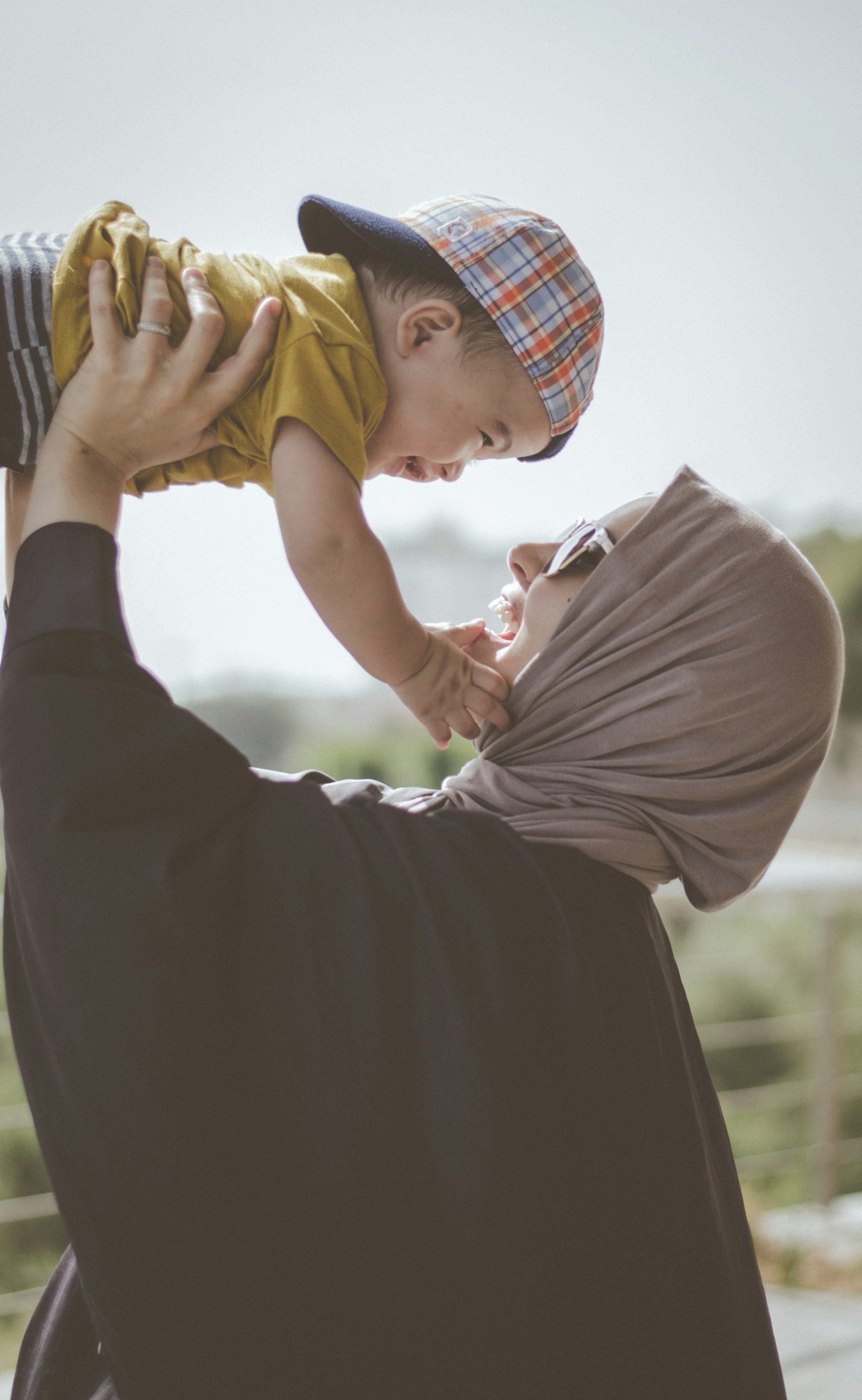
“Paradise is beneath her feet.” [PC: M T Elgassier (unsplash)]
These verses make clear that devotion to God entails love and care for parents, particularly for mothers who experience so much hardship. Such honorable statements felt uplifting to me in moments in which I felt unheard, and my struggles were invisible to others. They reminded me that raising a child is a profoundly spiritual act. A Prophetic narration that speaks also to motherhood as an act of worship states, if a pregnant woman dies during childbirth, she attains the highest state of martyrdom.The Messenger of Allah ﷺ said: “In that case the martyrs of my nation would be few. Being killed in the cause of Allah is martyrdom; dying of the plague is martyrdom; when a pregnant woman dies in childbirth, that is martyrdom; and dying of drowning, or burning, or of pleurisy, is martyrdom.”
The mother is most deserving of good treatment, as expressed also in this song, which I often sang with my daughters.
According to this narration, a man came to Prophet Muhammad  and asked, “O Messenger of God, who among the people is most deserving of my good companionship?” He said, “Your mother.” The man asked, “Then who?” He said, “Your mother.” The man further asked, “Then who?” He said, “Your mother.” The man asked again, “Then who?” He said, “Then your father.”
and asked, “O Messenger of God, who among the people is most deserving of my good companionship?” He said, “Your mother.” The man asked, “Then who?” He said, “Your mother.” The man further asked, “Then who?” He said, “Your mother.” The man asked again, “Then who?” He said, “Then your father.”
Paradise lies under the feet of mothers. Probably the most well-known narration within the Muslim community, this statement by our Prophet Muhammad  highlights the utmost importance of motherly care, respect, and attention.
highlights the utmost importance of motherly care, respect, and attention.
It was narrated from Mu’awiyah bin Jahimah As-Sulami, that Jahimah came to the Prophet ﷺ and said: “O Messenger of Allah! I want to go out and fight (in Jihad) and I have come to ask your advice.” He said: “Do you have a mother?” He said: “Yes.” He said: “Then stay with her, for Paradise is beneath her feet.”
What greater encouragement can be mentioned than the kind treatment of mothers being a gateway to personal eternal bliss and happiness?
In seventh-century Arabian society, marked by misogyny in which women were degraded, these sacred narrations were revolutionary. They still ring true today and present a call for action on an individual and collective level. Many mothers – and by extension fathers – long for quality connection and regular time with their adult children, who can be caught up in the business of life. Widespread neglect and social isolation of the elderly, particularly among women, is now well-documented. Needless to say that abusive and harmful parent-child relationships are outside of this discussion and deserve an entirely separate treatment.
In times of migration and mobility, biological parents may live far away. However, we can still spend time with motherly and fatherly figures around us who yearn for company. Prophet Muhammad’s  teachings call us to implement positive life changes and policies in which mothers, parents, and by extension, all those who are the most vulnerable, feel more fully seen and supported by love and care.
teachings call us to implement positive life changes and policies in which mothers, parents, and by extension, all those who are the most vulnerable, feel more fully seen and supported by love and care.
Related:
– Mothers: Honoring The Longing, The Losses, And The Love
– Difficulties Are Our Biggest Blessings: Notes From A Bereaved Mother With Three Calls From Jannah
The post On Motherhood: Finding Fortitude In The Prophet Muhammad’s Teachings appeared first on MuslimMatters.org.
Livestream: US throws Israel under the bus in Yemen deal
We speak to Donya Abu Sitta about trying to survive famine, David Sheen about Israel’s 7 October lies, the activist who climbed Big Ben and we discuss plans to send US mercenaries to Gaza.
Israel bombs restaurant as Gaza famine rages
“Alarming levels” of child mortality as siege enters third month.
Reviving Amanah: Trust And Responsibility In An Age Of Western Individualism
We hold the sacred treasures of the dunya within ourselves. The grand wonders, rare gems, and precious natural resources that we see as the riches of the world do not compare to what has been bestowed upon us. Amanah is an invisible yet powerful gift — something we hold, use, and share every day. It’s reflected in how we speak, what we listen to, how we see the world, what we do with our hands, and where we choose to go. Even our breath exists by Allah’s  Will. This sacred trust, given only to humans, is often forgotten and taken for granted, left unused like a treasure gathering dust.
Will. This sacred trust, given only to humans, is often forgotten and taken for granted, left unused like a treasure gathering dust.
The word “Amanah”, like many words in Arabic, holds multiple profound meanings, among which are trust, loyalty, and responsibility. These qualities are intrinsic to every believer—woven into their very being, breathed into their soul.
“Truly, We did offer the Amanah (trust) to the heavens and the earth, and the mountains, but they declined to bear it and were afraid of it; but man bore it. Verily, he was unjust and ignorant.” [Surah Al-Ahzab; 33:72]
Ibn `Abbas explains in Tafsir al-Qurtubi that this Amanah refers to the responsibilities and obligations that Allah  has entrusted to humanity, including acts of worship, obedience, and moral duties. The heavens, earth, and mountains, despite their vastness and strength, refused this burden out of reverence for Allah’s
has entrusted to humanity, including acts of worship, obedience, and moral duties. The heavens, earth, and mountains, despite their vastness and strength, refused this burden out of reverence for Allah’s  Command. Yet, mankind, often heedless and reckless, accepted it. This highlights both the great potential of human beings to fulfill divine commands and their tendency to neglect responsibilities.
Command. Yet, mankind, often heedless and reckless, accepted it. This highlights both the great potential of human beings to fulfill divine commands and their tendency to neglect responsibilities.
As time moves forward, kingdoms are built, conquered, and fall. Though the meaning of Amanah has shifted slightly with each era, its core remains unchanged. History has recorded eras built on collective responsibility; wars fought to protect dignity, societies created to nurture community, and ideas brought forth for the benefit of all. These moments form the tapestry of inherited connection and shared duty, illustrating how individual acts of trust and responsibility woven together can strengthen society.
The Decline of Amanah in Our CommunitiesIn the modern world, however, the gradual but rampant rise of individualism has led many to neglect this divine trust. As Islam continues to grow in the West, uniting hearts and forming new communities, we witness a shift in how faith is practiced compared to traditional societies. Many Muslims have migrated seeking opportunity and freedom, and while some have found both, the challenge of maintaining Islamic values within highly individualistic cultures remains. Traditional societies emphasize collectivism, familial duty, and shared responsibility—values that naturally reinforce Amanah. What may be perceived as intrusive in the West is often seen elsewhere as communal care and commitment.
Yet, after migrating, many face cultural shock not only from the broader society but from within the Muslim community. The realization that fellow Muslims may view you as a burden rather than a source of barakah is deeply painful. Navigating a new culture is already difficult, but without the safety net of communal responsibility, it becomes even harder.
The influence of Western autonomy and self-focus has slowly crept into Muslim communities. Masjids often form social cliques, making newcomers feel alienated. Marriages are restricted to narrow circles. Muslim consumers may bypass Muslim-owned businesses, and some business owners exploit their community, assuming loyalty will justify price hikes. More troubling is the growing disconnect in immigrant communities themselves; by the second generation, the collective spirit their parents knew begins to dwindle. Children raised in the West may not inherit the same bonds of mutual duty, leading to fragmented communities and a decline in the practice of Amanah. In trying to adapt, we risk building communities shaped by cultural convenience rather than Islamic principles.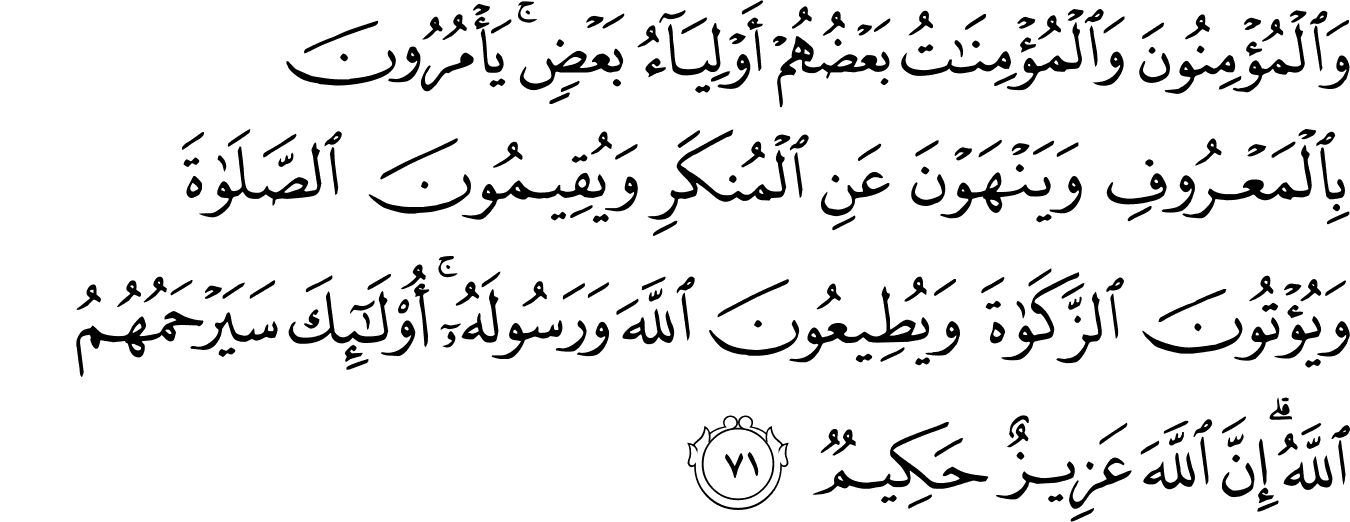
“The believing men and believing women are allies of one another. They enjoin what is right and forbid what is wrong and establish prayer and give zakah and obey Allah and His Messenger. Those—Allah will have mercy upon them. Indeed, Allah is Exalted in Might and Wise.” [Surah Tawbah, 9:71]
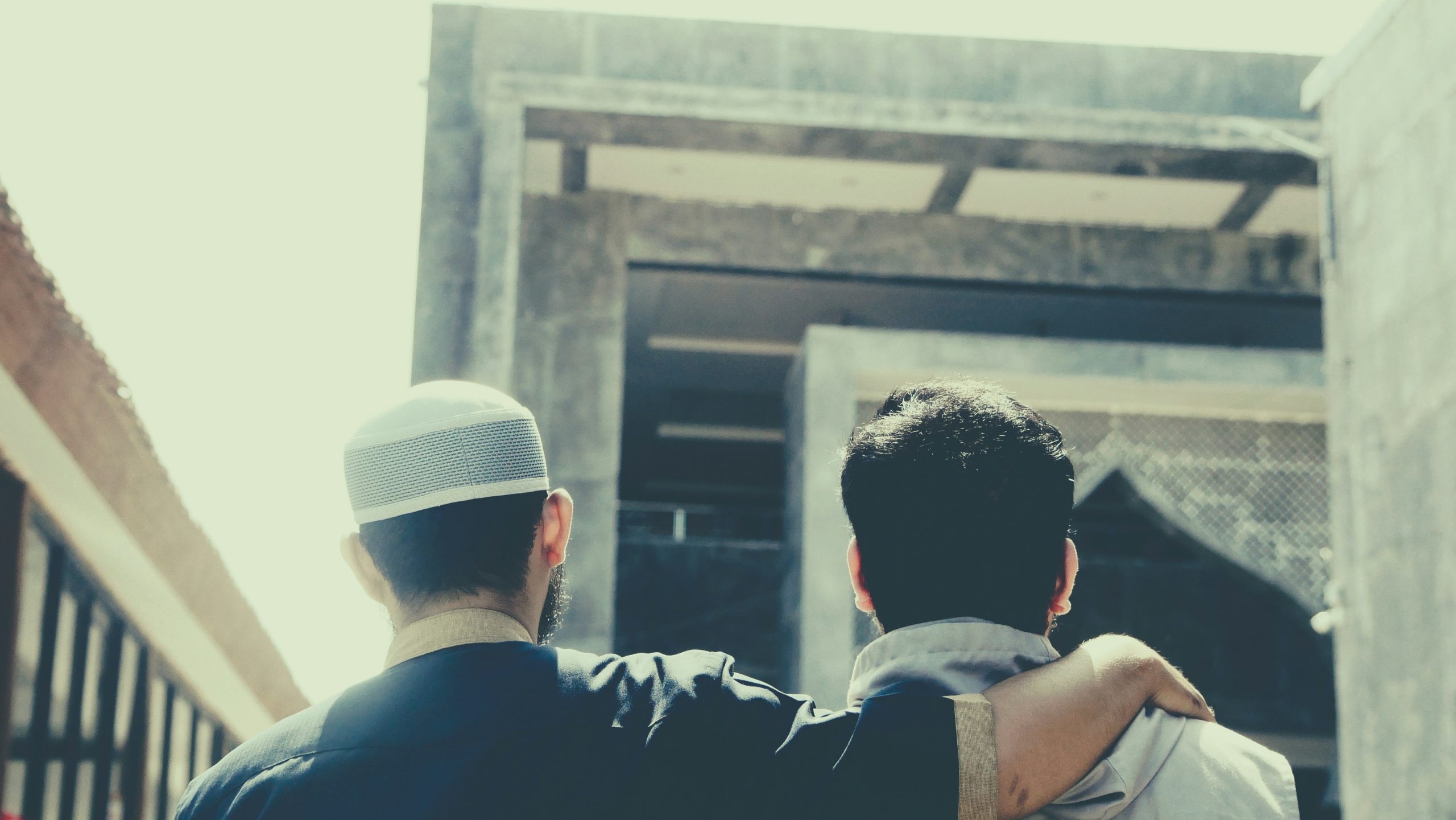
The Prophet [saw] established mu’akhah (brotherhood). [PC: Masjid MABA (unsplash)]
This verse reminds us of the mu’akhah (brotherhood) the Prophet established between the Muhajirun and the Ansar. When the Prophet
established between the Muhajirun and the Ansar. When the Prophet  and his companions migrated to Madinah, the Muhajirun left behind everything. To ensure their well-being, the Prophet
and his companions migrated to Madinah, the Muhajirun left behind everything. To ensure their well-being, the Prophet  established this bond of brotherhood between them and the Ansar, pairing individuals together. The Ansar embraced the Muhajirun with unparalleled generosity, sharing their homes, wealth, and resources without hesitation, embodying the principle of believers as allies. This brotherhood reflected true Amanah. As seen in Al-Sirah Al-Nabawiyyah, pairings like Bilal
established this bond of brotherhood between them and the Ansar, pairing individuals together. The Ansar embraced the Muhajirun with unparalleled generosity, sharing their homes, wealth, and resources without hesitation, embodying the principle of believers as allies. This brotherhood reflected true Amanah. As seen in Al-Sirah Al-Nabawiyyah, pairings like Bilal  and Abu Ruwayhah
and Abu Ruwayhah  -a former African slave and a renowned Arab poet- shattered societal barriers, proving that Islam is founded on taqwa, not race or status. Such examples are timeless lessons on how to build communities grounded in trust and responsibility.
The Rise of “Self”-Culture
-a former African slave and a renowned Arab poet- shattered societal barriers, proving that Islam is founded on taqwa, not race or status. Such examples are timeless lessons on how to build communities grounded in trust and responsibility.
The Rise of “Self”-Culture
“Self-made,” “Self-owned,” “Self-sufficient” — Western ideals often idolize self-reliance, but in doing so, they risk idolizing the self above all else. The concept of the self has pandered to the innate greed we all have; one of our fatal flaws. In individualistic societies, the sense of Amanah can sometimes weaken, making it essential for believers to consciously uphold it. In such societies, Amanah becomes optional, not instinctive. Being a resource to others is a burden; hands are rarely extended in fear of responsibility being pressed into them, and contacts are spoken to only when in need of a favor. Clinical networking has replaced friendships, connections made superficially, quickly dropped when their usefulness has expired. In this climate, Amanah is commodified, leading to emotional disconnection not only from community, but from our very purpose.
Amanah also extends beyond human relationships. Our duty to Allah’s  Creation is often forgotten. Western industrialism, in its relentless pursuit of progress, clears forests, pollutes skies, and destroys ecosystems. Consider trees: Allah
Creation is often forgotten. Western industrialism, in its relentless pursuit of progress, clears forests, pollutes skies, and destroys ecosystems. Consider trees: Allah  has created them to serve as carbon sinks, converting harmful carbon dioxide into oxygen, but also to act as natural protectors or barriers, shielding the land from erosion, floods, and extreme temperatures. Yet, in the race for industrial expansion and urban development, many societies have prioritized human invention over nature’s wisdom, clearing forests to make way for highways, commercial centers, and corporate infrastructure.
has created them to serve as carbon sinks, converting harmful carbon dioxide into oxygen, but also to act as natural protectors or barriers, shielding the land from erosion, floods, and extreme temperatures. Yet, in the race for industrial expansion and urban development, many societies have prioritized human invention over nature’s wisdom, clearing forests to make way for highways, commercial centers, and corporate infrastructure.
The Loss of AmanahWhen we fail to honor our responsibility to the natural world, we risk losing a fundamental part of our humanity: our ability to care, to protect, and to recognize that true progress is measured not by what we build, but by what we preserve. This pattern goes beyond environmental damage; it reflects a deeper moral and spiritual crisis—the gradual erosion of Amanah in our hearts.
The Prophet Muhammad  warned:
warned:
“A man may sleep and Amanah will be taken from his heart, leaving nothing but a trace like a blister left by a coal… Then people will buy and sell, and hardly anyone will be paying attention to Amanah, until it will be said that among such-and-such a tribe there is a trustworthy man.” [Sahih al-Bukhari and Sahih Muslim]
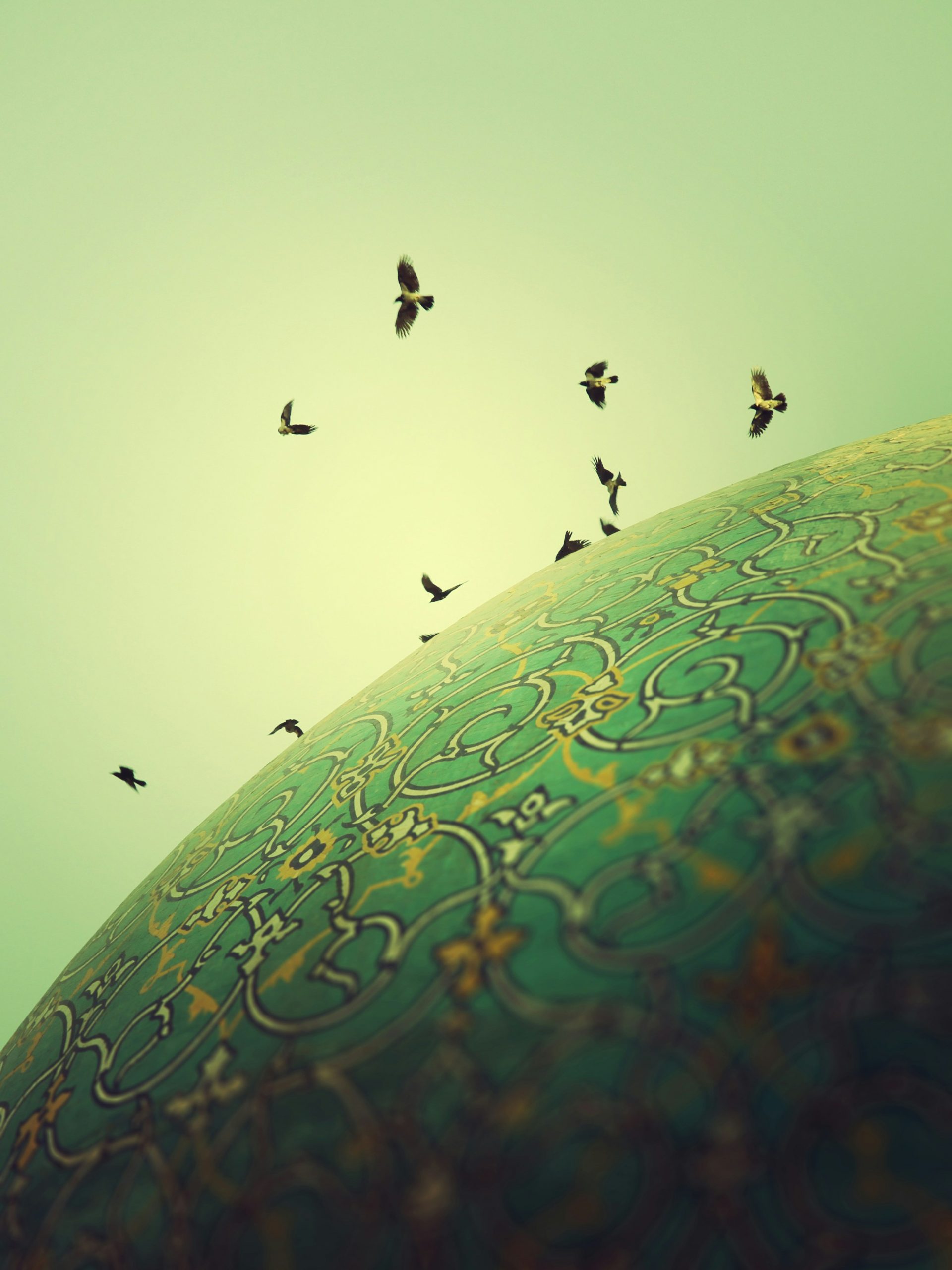
“When we fail to honor our responsibility to the natural world, we risk losing a fundamental part of our humanity.” [PC: Hasan Almasi (unsplash)]
This hadith of the Prophet Muhammad about the gradual erosion of Amanah warns that trust, honesty, and moral responsibility will slowly fade from society, so much so that finding a truly trustworthy person who upholds all the qualities of a believer with Amanah becomes rare. The hadith further describes how Amanah will be taken from people’s hearts step by step, much like a person sleeping and waking up to find it gone. The Prophet
about the gradual erosion of Amanah warns that trust, honesty, and moral responsibility will slowly fade from society, so much so that finding a truly trustworthy person who upholds all the qualities of a believer with Amanah becomes rare. The hadith further describes how Amanah will be taken from people’s hearts step by step, much like a person sleeping and waking up to find it gone. The Prophet  illustrates this process using the metaphor of a blister left by a burning coal—a painful incident that then leaves a mark that eventually disappears altogether. This warning is deeply connected to the ayah from Surah At-Tawbah and the mu’akhah, reflecting a time when Amanah was central to the early Muslim community, where believers were bound by mutual support, honesty, and moral duty. However, the Prophet
illustrates this process using the metaphor of a blister left by a burning coal—a painful incident that then leaves a mark that eventually disappears altogether. This warning is deeply connected to the ayah from Surah At-Tawbah and the mu’akhah, reflecting a time when Amanah was central to the early Muslim community, where believers were bound by mutual support, honesty, and moral duty. However, the Prophet  warns that over time, Amanah will no longer be a defining trait of society. In commerce, governance, and daily interactions, honesty will gradually erode until trust becomes so rare that a truly trustworthy person is seen as an exception rather than the standard. This warning is for more than just financial dealings—it speaks to a broader decline in moral responsibility, ethical leadership, and the sincerity of human relationships. When trust diminishes, communities weaken, and the very fabric of society is compromised. The Prophet’s
warns that over time, Amanah will no longer be a defining trait of society. In commerce, governance, and daily interactions, honesty will gradually erode until trust becomes so rare that a truly trustworthy person is seen as an exception rather than the standard. This warning is for more than just financial dealings—it speaks to a broader decline in moral responsibility, ethical leadership, and the sincerity of human relationships. When trust diminishes, communities weaken, and the very fabric of society is compromised. The Prophet’s  words serve as a timeless reminder to uphold Amanah in all aspects of life, ensuring that integrity remains the foundation of both personal and collective well-being.
words serve as a timeless reminder to uphold Amanah in all aspects of life, ensuring that integrity remains the foundation of both personal and collective well-being.
The Qur’an further warns:
“So that Allah will punish the hypocrites, men and women, and the idolaters, men and women, while Allah will pardon the believers, men and women. And Allah is Ever Oft-Forgiving, Most Merciful.” [Surah Al-Ahzab 33:73]
Here, neglecting trust is linked to hypocrisy. Upholding it earns Allah’s  Mercy. Amanah is not just moral—it is spiritual, essential to our standing with Allah
Mercy. Amanah is not just moral—it is spiritual, essential to our standing with Allah  .
.
To strengthen Amanah within ourselves, we must commit to living with integrity, accountability, and care in all aspects of life. This includes how we treat others, how we manage our responsibilities, and how we connect with Allah  and the world around us. To get started, below are a few practical ways to uphold and nurture Amanah within ourselves and our communities:
and the world around us. To get started, below are a few practical ways to uphold and nurture Amanah within ourselves and our communities:
- Embrace honesty and integrity.
- Keep promises and speak truthfully.
- Fulfill responsibilities with sincerity.
- Engage in ethical financial conduct.
- Deepen spiritual connection with Allah
 .
. - Foster inclusive, collaborative communities.
- Support Muslim businesses ethically.
- Protect the environment.
- Teach the next generation about Amanah.
Amanah is a sacred trust that extends beyond our individual relationships to all of Allah’s  Creation. Upholding it requires us to live with integrity, responsibility, and care. By nurturing trust in our actions and relationships, we can rebuild stronger communities grounded in Islamic values. This return to Amanah will help us build a society that reflects the mercy, justice, and unity that Islam commands.
Creation. Upholding it requires us to live with integrity, responsibility, and care. By nurturing trust in our actions and relationships, we can rebuild stronger communities grounded in Islamic values. This return to Amanah will help us build a society that reflects the mercy, justice, and unity that Islam commands.
Related:
– Rethinking Work-Life Balance Through The Lens Of Amanah
– Make your Deen Green: Muslims and their Responsibility to the Environment
The post Reviving Amanah: Trust And Responsibility In An Age Of Western Individualism appeared first on MuslimMatters.org.
